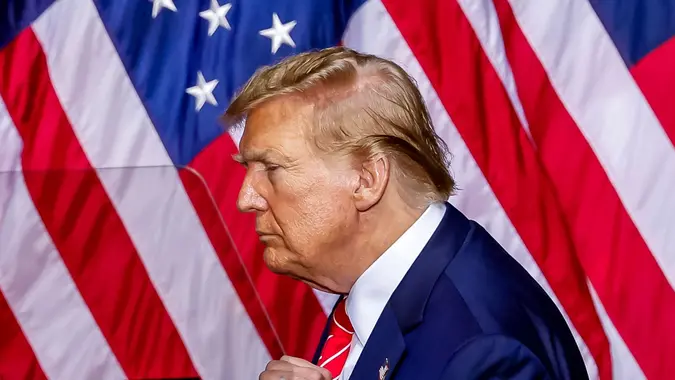4 Ways Elections Can Affect Retirement Savings

Commitment to Our Readers
GOBankingRates' editorial team is committed to bringing you unbiased reviews and information. We use data-driven methodologies to evaluate financial products and services - our reviews and ratings are not influenced by advertisers. You can read more about our editorial guidelines and our products and services review methodology.

20 Years
Helping You Live Richer

Reviewed
by Experts

Trusted by
Millions of Readers
Sick of hearing your coworker pledge that she’s “moving to another country” if one candidate or the other wins in November?
While almost no one actually moves overseas over an election outcome, a surprising number of Americans do delay major financial decisions and behaviors based on election uncertainty.
Watch out for these retirement-related risks as you follow the upcoming 2024 presidential election (and state of politics in general).
1. Delayed Retirement Savings & Investments
Per a recent Voya Financial survey, over a third (35%) of working Americans say they are “delaying decisions about saving for retirement until after the 2024 presidential and congressional elections.”
A further 42% “believe that the pending elections will have a severe or major impact on their ability to save for retirement.”
Do you know what actually hurts your retirement nest egg? Waiting longer to save for retirement. You spend money you should have saved, miss out on compound returns and miss out on dividends — and other income that would have been generated by your investments.
For that matter, stock prices could be 10%, 20%, 30% higher by the time you break out of your political paralysis and start investing again.
Yes, elections matter — we should all exercise our civic liberty and vote. No, you shouldn’t put off smart financial behaviors like saving and investing just because your preferred candidate may not prevail.
2. Stock Markets
How do stock markets perform during presidential election years compared to other years?
There is a slight difference in average returns. A 2024 study by T. Rowe Price found that the S&P 500 has delivered an average return of 11% in presidential election years, compared to 11.6% in non-election years.
That makes for a quirky cocktail party statistic, but it shouldn’t dictate your investment decisions. Don’t justify spending more and investing less this year just because some past election years have delivered average returns slightly lower than other years.
Perhaps surprisingly, the same study found that presidential elections don’t cause any additional stock market volatility. “Except for the 12 months before and the month immediately following the vote, the S&P 500 experienced less volatility, on average, in and around election years compared with similar periods in non-election years,” study authors Thomas Poullaouec and Nathan Wang stated.
3. Taxes
Presidents can influence tax policies, even if tax rates are set by Congress.
For example, real estate investors love the accelerated and bonus depreciation tax policies created by the Tax Cuts and Jobs Act of 2017, one of President Trump’s signature legislative wins. Those provisions have already started sunsetting, but are far more likely to be extended if Donald Trump wins reelection.
Likewise, a win by President Biden would have its own impact on retirement taxes and policies. The Biden White House budget proposal called for several tax changes, particularly concerning wealthier individuals and corporations.
4. Recession Risk
No matter who wins in November, the year after presidential elections has historically seen higher risk of recession.
Much higher, as it turns out. The T. Rowe Price study found that “More than half (54%) of the 12-month periods following the 24 presidential elections in our study overlapped an official U.S. recession, as identified by the National Bureau of Economic Research (NBER).”
“This rate of recession occurrence was meaningfully higher than the averages for the other years of a president’s term: 29% for the second year in office, 17% in the third year, and 25% in the election year,” Poullaouec and Wang outlined.
Stick With the Fundamentals
You can’t predict the future. But no matter who wins in November, you can be sure that the sun will rise the next day — and that you’ll still need a retirement nest egg.
Set a target savings rate, setting aside a certain percentage of every paycheck for retirement investments. Take advantage of matching contributions from your employer, if available. Invest in a diversified portfolio.
In other words, stick to the fundamentals of budgeting, saving, investing and building wealth over time. That, you can control. Everything else — you’ll just have to adapt to as it comes.
 Written by
Written by  Edited by
Edited by 

























